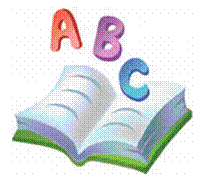Instructions for the reading:
1. Skim the text first. Get the idea of it – What is it about?
2. Study the words given after the text.
3. Read the text again until you fully understand it.
4. Ask questions to each paragraph. It will help you organize your ideas.
5. Retell the text: underline the key words and define the main idea of each paragraph.
 Nowadays English is the language of international communication. About 350 mln people speak English as their first language. It is an official language in 44 countries. In many others it is used in business, commerce and technologies. There is a number of variants of the English language, among them American, Australian, Scottish, Indian and some others but British English is the core language. Other variants of it have their peculiarities in grammar, vocabulary and spelling. Compare British and American English in the following examples:
Nowadays English is the language of international communication. About 350 mln people speak English as their first language. It is an official language in 44 countries. In many others it is used in business, commerce and technologies. There is a number of variants of the English language, among them American, Australian, Scottish, Indian and some others but British English is the core language. Other variants of it have their peculiarities in grammar, vocabulary and spelling. Compare British and American English in the following examples:
Vocabulary: petrol - gas, autumn - fall, class - grade, flat - apartment, sweet - candy;
Spelling: theatre – theater, programme – programe, colour –color.
What are the features of the English language?
– Simplicity of its forms: verbs have a few inflections and adjectives are not changed in unity with a noun: a pretty girl / pretty girls.
– Flexibility: without inflections, English has become a very flexible language. The same word can be used as a different part of speech: water to drinkand to water the flowers. What is more, individual words can be flexible too: a round table, to turn round, to run round the field, a round of drinks.
– Openness of its vocabulary: a) free admission of words from other languages; b) easy creation of compounds and derivatives: rainbow, greenhouse, mother-in-law or to invent, inventor, invention, inventive, inventory.
New words have made English an effective means of international communication. Some ‘created words’: astronaut, hot dog, rock’n roll, Xerox, to Xerox, helicopter, workaholic, etc. Some loan words / borrowings: prince/princess, royal, country, crime, government, parliament, art, adventure (Latin origin); admiral, algebra, orange, sugar, coffee, zero (Arabic); piano, spaghetti (Italian); yoghurt, kiosk (Turkish); theatre, astronomy, critic, history, comedy, catastrophe, atmosphere (Greek); icon, czar/tsar, glasnost, vodka, sputnik (Russian); cossack, pysanka, bandura, paska/paskha (Ukrainian); tea, silk (Chinese); opera, balcony, piano, umbrella, violin (Italian); rendezvous, café, haute couture, pensive (Modern French); kindergarten, hamburger, delicatessen (Modern German).
In addition, some words from the history of the country. Among ancient inhabitants of Great Britain were the Celts. The language they spoke was not like the English of today. Not much of their vocabulary has remained in the language spoken by the English people now. Throughout its history, Great Britain was occupied by different tribes and nations. What did every invasion bring? –A new language, culture, traditions, etc. The Roman period of British history, for example, lasted for 465 years. Its influence on the nation was great.
German tribes: the Saxons, Angles and others conquered the land in the 5lh century. The country in which they had settled was named England.
The Normans from France came to Great Britain in 1066 and the great battle between the English and Normans began. The battle in which the Normans won was near the town of Hastings. William, the head of the Normans, was called the Conqueror after that battle. He became the king of England. This was the 5th and the last invasion of England.
Help:
Feature – риса
Inflection - закінчення
Adjective- прикметник
Flexibility –гнучкість
Strength – сила
Admission – допуск
Compound – складова (слова)
Derivative – утворене слово
Ancient – стародавній
Inhabitant – житель
The Celts - кельти
Tribe – плем’я
Conquer – завойовувати
Invasion – вторгнення
 2015-09-07
2015-09-07 1245
1245
